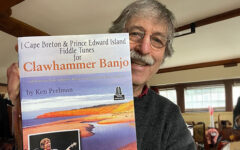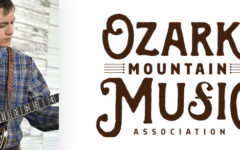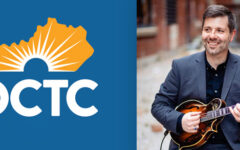Over the next few months, while college choices for rising high school seniors are forefront in the minds of many students and parents, we will present a series of interviews on Bluegrass Today with administrators/faculty members at colleges and universities where young bluegrass or acoustic musicians might want to study.
You can read all the posts in this series here.
 First up is Roger H. Brown, President of the Berklee College of Music in Boston, MA. Brown brings an appreciation for a wide variety of musical styles – including bluegrass and traditional folk music – to his job running one of the most prestigious music schools in the world. He also recently approved the inclusion of both five string banjo and mandolin as principal instruments for study at Berklee.
First up is Roger H. Brown, President of the Berklee College of Music in Boston, MA. Brown brings an appreciation for a wide variety of musical styles – including bluegrass and traditional folk music – to his job running one of the most prestigious music schools in the world. He also recently approved the inclusion of both five string banjo and mandolin as principal instruments for study at Berklee.
Like many schools that mix a serious study of music with related disciplines (education, music technology, music business, performance, composition), Berklee requires that every student declare a principal instrument on which they must study for a minimum of two years, regardless of their major.
I asked Roger if the traditional string principal (banjo/mandolin) appealed to him immediately when it was presented.
Absolutely. We already had the foundations of a great string department with Matt Glaser as Chair, himself a highly regarded fiddler and connected to the Mark O’Connor, Bela Fleck axis of hot string players. Cellist Eugene Friesen on the faculty made his mark with the Paul Winter Consort. John McGann is a national flatpicking champion and excellent mandolin player. Dave Hollender had a robust bluegrass ensemble in operation. In addition, we had alumni like Gillian Welch and Dave Rawlings writing and performing very successfully, Casey Driessen was touring with Bela Fleck, and Andy Hall and Chris Pandolfi had come together on dobro and banjo with the Infamous Stringdusters. Cellist Rushad Eggleston [Crooked Still] was, to the best of my knowledge, the first at Berklee to be nominated for a Grammy while still a student. The groundwork was absolutely all laid. I just needed to sprinkle some holy water on the initiative. So, what we implemented was an acoustic string principle, adding banjo and mandolin to the existing programs for guitar and violin.
Roger did not study music in college, but entered the business as a self-taught drummer playing blues and funk music. He said that he dropped out of high school band in favor of football.
I wondered how a funk drummer came to be interested in bluegrass.
I love the banjo. My ears always perk up whenever I hear one. I never learned to play, but if I were to live my life over, maybe….
When I visited him in his office earlier this year, Roger spoke of how he became passionate about bluegrass and old time music, and he showed me one of his prized possessions on display.
My great grandfather was a minister and fiddler who lived in the North Carolina mountains near Valle Crucis. I have his fiddle with homemade replacement parts sitting in my office. In high school, we would drive to the Georgia mountains near my hometown and go to dances where bluegrass and traditional Appalachian music was the music of choice.
Roger answered a few more questions about the traditional string principal at Berklee.
How do you see this principal fitting in to the Berklee mission?
Berklee is about virtuosic musicians creating music at the cutting edge. This group is absolutely doing so. In fact, the similarities between the innovative bluegrass movement and jazz are striking.
What advice can you offer young bluegrass players who would like to consider applying to Berklee?
Get your chops together. Practice hard, learn as much as you can, keep your ears and mind open, and then come share what you have learned with the rest of us. We are a very exciting place to be a young musician.
How important are music reading skills to gaining admission?
Reading skills are not essential to be admitted to Berklee. But we expect every graduate to have developed strong reading skills. Many of our strongest players are people who come from Gospel music, rock music, folk, blues or bluegrass traditions where reading is less emphasized. What we need to see clearly in the audition (now required for all applicants) is dedication, strong musical aptitude, and creativity. We have a mantra that we want to be sure our admissions process would admit people like Ornette Coleman, John Lennon, Laurie Anderson, or Earl Scruggs — people who may not look like a traditional conservatory bound student.
How does an instrument like the banjo fit into ensembles?
Beautifully!
Do banjo and mandolin students have to achieve the same sort of technical and theoretical proficiencies as other instruments in order to stay in the program?
Yes, part of the process we used to develop the acoustic string principle was to develop these proficiencies.
To sum up, is it fair to say that a bluegrass mandolinist who wants to study songwriting and music business could hope to come to Berklee?
In my biased opinion, there would be no better place on earth for that young musician to go to school. We have a very strong songwriting faculty, some amazing acoustic string musicians, and an environment that is a rain forest of musical ideas and diversity.
 You can read more about Roger Brown in the school’s in house magazine, Berklee Today.
You can read more about Roger Brown in the school’s in house magazine, Berklee Today.
For more information about Berklee admissions, visit the school’s web site.
We plan to post similar interviews with administrators and/or faculty at East Tennessee State University and South Plains College. If you know of another school that we should include, or are involved with a program that would be of interest to students wishing to pursue higher education in music with a focus on traditional/bluegrass string instruments, please contact us.







